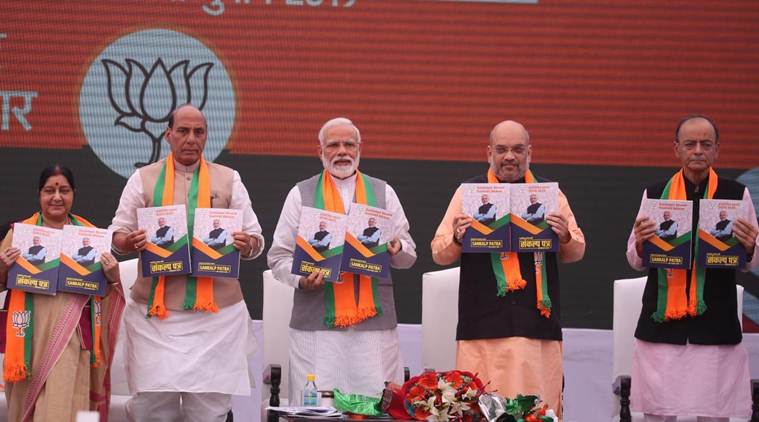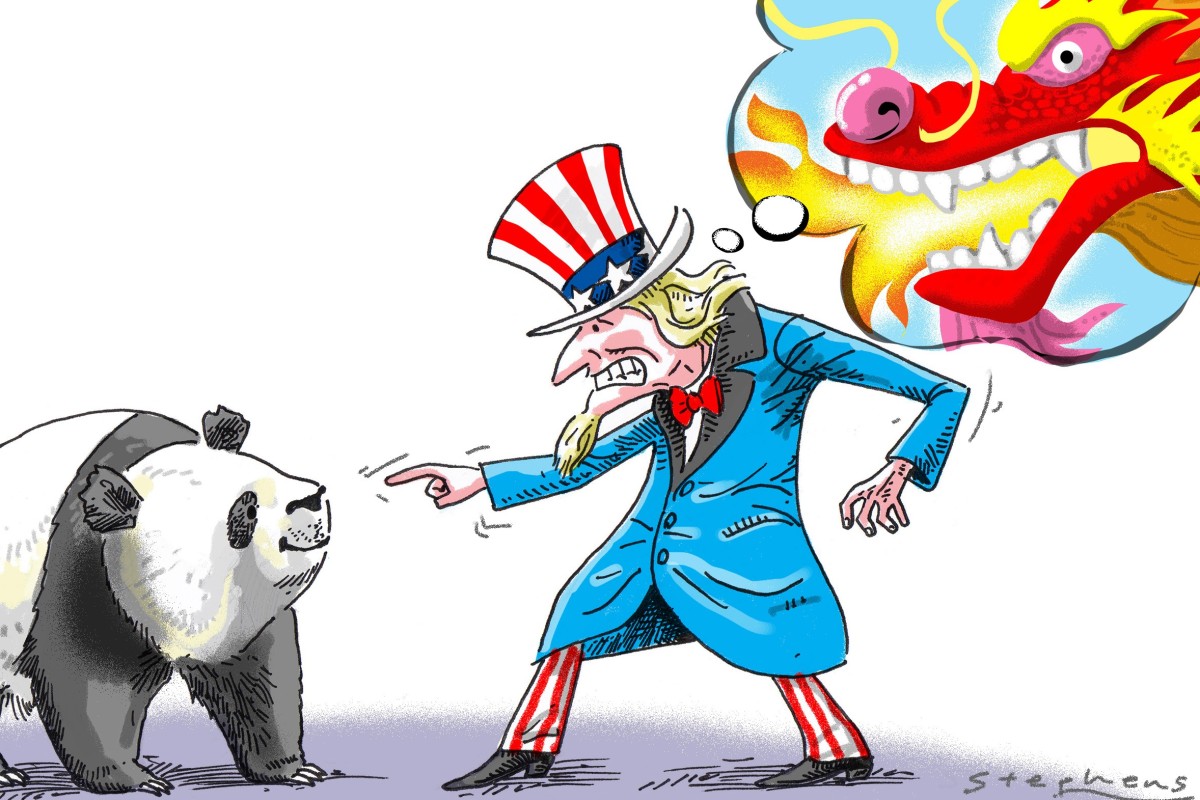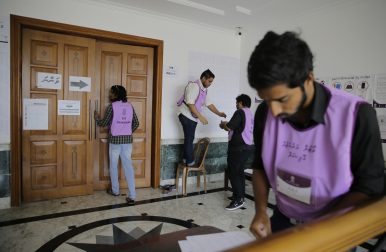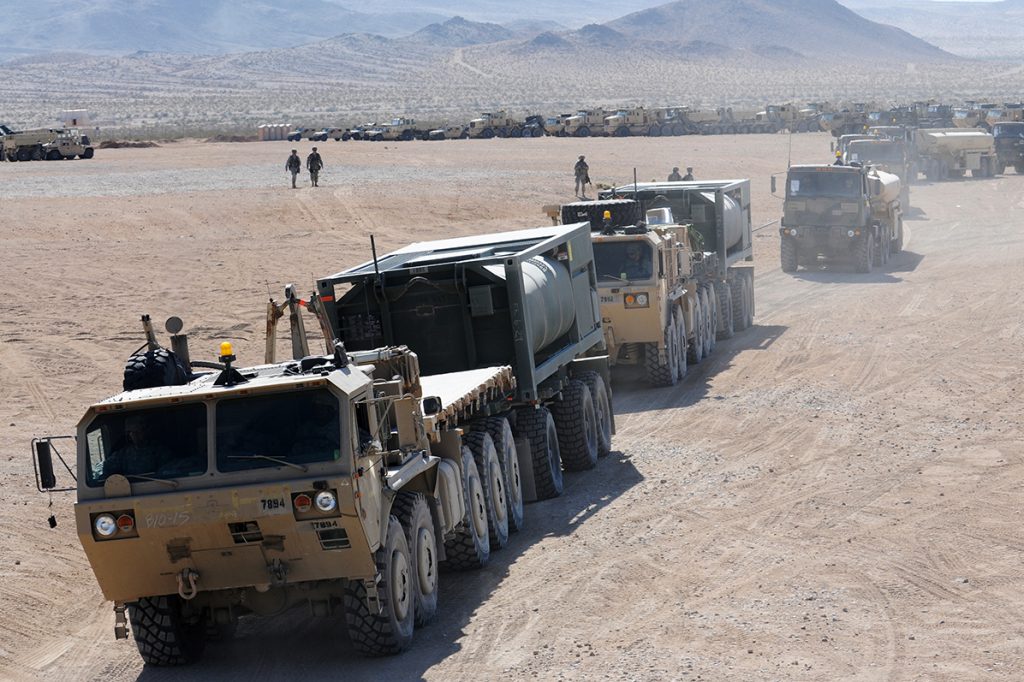This publication contends that the peace negotiations between the Taliban in Afghanistan and major powers like the US and Russia has left India in a quandary. India’s policy of unconditional support to the Afghan government is hitting a roadblock, as external actors are increasingly sidelining the government not only in the peace negotiations, but also in the country’s internal reconfiguration. Will New Delhi reach out to the Taliban and other stakeholders? Alternatively, will it continue with its present policy of supporting the Afghan government? More importantly, will the benefits of the last decade of soft power translate into tangible gains?
12 April 2019
Manifestos of BJP, Congress indicate that when it comes to foreign policy, ambiguity is better than clarity
by C. Raja Mohan
 C. Raja Mohan is Director, Institute of South Asian Studies, National University of Singapore, and the consulting editor on foreign affairs for 'The Indian Express'. Before his association with The Indian Express began in 2004, Raja Mohan worked for The Hindu as its Washington correspondent and Strategic Affairs Editor. He was a distinguished fellow at the Observer Research Foundation, New Delhi. In his academic avatar, Raja Mohan has been professor of South Asian Studies at the Jawaharlal Nehru University, New Delhi, and the Nanyang Technological University, Singapore. As a think tanker, he worked at the Institute for Defence Studies and Analyses and Centre for Policy Research in New Delhi. He is on the editorial board of various international affairs journals and is affiliated with the Institute of South Asian Studies, Singapore; the Lowy Institute, Sydney; and the Carnegie Endowment for International Peace, Washington DC. He is the author, most recently, of Samudra Manthan: Sino-Indian Rivalry in the Indo-Pacific.71 Shares
C. Raja Mohan is Director, Institute of South Asian Studies, National University of Singapore, and the consulting editor on foreign affairs for 'The Indian Express'. Before his association with The Indian Express began in 2004, Raja Mohan worked for The Hindu as its Washington correspondent and Strategic Affairs Editor. He was a distinguished fellow at the Observer Research Foundation, New Delhi. In his academic avatar, Raja Mohan has been professor of South Asian Studies at the Jawaharlal Nehru University, New Delhi, and the Nanyang Technological University, Singapore. As a think tanker, he worked at the Institute for Defence Studies and Analyses and Centre for Policy Research in New Delhi. He is on the editorial board of various international affairs journals and is affiliated with the Institute of South Asian Studies, Singapore; the Lowy Institute, Sydney; and the Carnegie Endowment for International Peace, Washington DC. He is the author, most recently, of Samudra Manthan: Sino-Indian Rivalry in the Indo-Pacific.71 Shares
The BJP released its election manifesto in New Delhi on Monday. (Express photo/Neeraj Priyadarshi)
Warning Intelligence Update: The Wild Card That Could Derail U.S. Efforts in Afghanistan
By Scott DesMarais
Key Takeaway: The Government of Afghanistan faces an impending constitutional crisis that could destabilize the country absent significant diplomatic engagement by the U.S. Afghan President Ashraf Ghani’s legal term expires on May 22, 2019, but Afghanistan will not hold new presidential elections until at least September 28. Powerful opposition leaders are demanding a transitional government to bridge the gap until elections but have no agreed-upon plan for governance. A destabilizing competition amongst powerbrokers would derail U.S. efforts to facilitate reconciliation with the Taliban and could trigger state collapse in Afghanistan.
TRIPWIRE
Bulldozing mosques: the latest tactic in China’s war against Uighur culture
Rachel Harris
 Ten years ago, I started researching Islam among the Uighurs. I spent my summers travelling around the Xinjiang region in western China. I took long bus journeys through the desert to Kashgar, Yarkand and Kucha, slept on brick beds in family homes in remote villages, stopped off at Sufi shrines, and visited many, many mosques. My husband was working with me, and we dragged our kids along for the ride. The kids were quite small and not at all interested in our boring interviews with imams, and I bribed them with treats. I have a lot of photos of them sitting in the dust outside mosques, faces smeared with ice-cream, playing on their iPads.
Ten years ago, I started researching Islam among the Uighurs. I spent my summers travelling around the Xinjiang region in western China. I took long bus journeys through the desert to Kashgar, Yarkand and Kucha, slept on brick beds in family homes in remote villages, stopped off at Sufi shrines, and visited many, many mosques. My husband was working with me, and we dragged our kids along for the ride. The kids were quite small and not at all interested in our boring interviews with imams, and I bribed them with treats. I have a lot of photos of them sitting in the dust outside mosques, faces smeared with ice-cream, playing on their iPads.Report: China’s Closing the Innovation Gap
By Brandi Vincent,
 China is progressing more rapidly in innovation and advanced technology industries than the United States, according to a report published by Information Technology and Innovation Foundation today.
China is progressing more rapidly in innovation and advanced technology industries than the United States, according to a report published by Information Technology and Innovation Foundation today.
“In the span of about a decade, the Chinese economy has made dramatic progress in innovation relative to the United States,” Robert Atkinson, ITIF president and lead author of the report said in a statement. “Backed up by a powerful, unfair arsenal of state policies, China has evolved from an innovation-copier to a reverse innovator and now an innovator in its own right.”
The report concludes that China has done more than any other government in history to promote an innovation-based economy—and the implications could threaten its competitors.
“Given China’s Made in 2025 plan, [a strategic policy to upgrade its manufacturing capabilities and develop high-tech industries] coupled with unfair mercantilist policies, it is no exaggeration to suggest that, without aggressive action, leading economies such as Europe, Japan, Korea, and the United States will, within two decades, likely face a world wherein their advanced industry firms face much stiffer competition and have fewer jobs in industries as diverse as semiconductors, computers, biopharmaceuticals, aerospace, Internet, digital media, and automobiles,” the report said.
What Are China’s Cyber Capabilities and Intentions?
By Lyu Jinghua
 News stories on the cyber threat that China poses appear on a regular basis. Most underscore a view that China is using cyber power to rise and ultimately win global dominance, and that the Chinese government is behind the scenes in many malicious cyber activities. Though many of the allegations focus on the tension between China and the United States on cyber espionage, these actions are unlikely to cause armed conflict since almost all capable actors conduct cyber espionage.
News stories on the cyber threat that China poses appear on a regular basis. Most underscore a view that China is using cyber power to rise and ultimately win global dominance, and that the Chinese government is behind the scenes in many malicious cyber activities. Though many of the allegations focus on the tension between China and the United States on cyber espionage, these actions are unlikely to cause armed conflict since almost all capable actors conduct cyber espionage.
Suspicions of intentions and capabilities of cyber warfare, however, could drag the US and China into arms races, and even hot wars, due to the role cyber tools can play in military operations. Given the risks, it is necessary to examine China’s views on cyber warfare from a narrative that is different from what most readers are familiar with.
Context for China’s Views on Cyber Warfare
China’s Rise and Modern Military Technology: Part I
By Andrea Gilli and Mauro Gilli
 We would like to thank Professor Robert Farley for the attention he has given to our article “Why China Has Not Caught Up Yet” (which has since become freely available online). We are glad to read that Professor Farley thinks the implications of our work need to be discussed further. As scholars, there is no greater reward than knowing our colleagues value and appreciate our work. In particular, given Professor Farley’s expertise in military technology and the fact that he is no stranger to controversy, we are particularly pleased to know he largely agrees with us – which suggests the road we have taken with this project was correct. The points he has raised, moreover, permit us to address aspects that either we could not, for space reasons, discuss in our article or that we intended to work on in the future.
We would like to thank Professor Robert Farley for the attention he has given to our article “Why China Has Not Caught Up Yet” (which has since become freely available online). We are glad to read that Professor Farley thinks the implications of our work need to be discussed further. As scholars, there is no greater reward than knowing our colleagues value and appreciate our work. In particular, given Professor Farley’s expertise in military technology and the fact that he is no stranger to controversy, we are particularly pleased to know he largely agrees with us – which suggests the road we have taken with this project was correct. The points he has raised, moreover, permit us to address aspects that either we could not, for space reasons, discuss in our article or that we intended to work on in the future.
Summary Of Our Article
How Should Europe Handle Relations with China?
On April 9, China’s Premier Li Keqiang will visit Brussels for the EU-China Summit —as European nations debate where to draw the line on investment, national security, and emerging technologies. How should Europe, and various European nations, handle their relationship with China? And is Europe breaking into two spheres of influence—one American and one Chinese? —The Editors
America’s latest ‘red scare’ is overblown. China is not intent on world domination
Tom Plate
 In the coming month, look for broad gripes and bright anti-red stars over the land of the free and the home of the brave. For starters, the Committee on the Present Danger: China begins its anti-communist show in the US capital this week. The self-appointed panel includes not only former defence and intelligence officials, some barely disguised frontmen for the US military-industrial complex, but also political personalities of the more entertaining kind, such as Republican Newt Gingrich, a former House speaker and once-college professor who is as colourful as he is sometimes unbalanced.
In the coming month, look for broad gripes and bright anti-red stars over the land of the free and the home of the brave. For starters, the Committee on the Present Danger: China begins its anti-communist show in the US capital this week. The self-appointed panel includes not only former defence and intelligence officials, some barely disguised frontmen for the US military-industrial complex, but also political personalities of the more entertaining kind, such as Republican Newt Gingrich, a former House speaker and once-college professor who is as colourful as he is sometimes unbalanced.
Even so, the propaganda attack against “the PRC’s ominous trajectory” – the committee’s phrase – is well timed. Sino-US relations, which have never been light and lively, are a downright downer these days. Right now, there is more civility in an angry Hong Kong couple pacing back and forth in a 200 square foot flat than in the Beijing-Washington odd couple.
Maldives’ Crucial Ballot to Elect New Parliament
 People in the Maldives voted in a crucial parliamentary election on Saturday that many hope will help President Ibrahim Mohammed Solih overcome a coalition split that has hampered his efforts to restore political freedoms and tackle corruption.
People in the Maldives voted in a crucial parliamentary election on Saturday that many hope will help President Ibrahim Mohammed Solih overcome a coalition split that has hampered his efforts to restore political freedoms and tackle corruption.
Some voters who had lined up earlier were allowed to cast their vote well after balloting officially ended at 6 p.m. in the Indian Ocean archipelago nation known for its luxury resorts, said Ahmed Akram, an election official. He said voter turnout was over 78 percent.
Officials were planning to announce results later Saturday night.
Solih’s Maldivian Democratic Party is seeking at least 44 seats in the 87-member parliament for a majority to pass legislation needed to implement pledges from last year’s presidential campaign. His coalition currently has 52 seats, but one partner with 22 seats is now aligned with former strongman Yameen Abdul Gayoom.
Could America Lose a War Well?
Mike Sweeny
Despite the ambiguous, if not outright adverse, outcomes of the wars the United States has fought since World War II, the shock of the US military being summarily defeated at the operational level is something with which the American public has seldom had to contend. Even in the case of Vietnam, the belief — justified or not — that the US military was never defeated on the battlefield has endured (and is perhaps now being applied to other wars.) The 1991 Gulf War established the extant impression of the US military as next-to-invincible, a reputation that the long, draining conflicts in Iraq and Afghanistan have not truly sullied. Those wars led to more piercing questions abouthow US military force should be applied rather than doubts over its qualitative value.
One needs to go back to the winter of 1950–51 for the last time American troops were decidedly routed en masse by an enemy: the grinding, agonizing retreats of US Army and Marine Corps units from northern Korea following China’s entry into the war. The constituent battles of that withdrawal, such as Chosin, are rightly remembered for the bravery of the American fighting man under some of the most abysmal conditions imaginable. But it was still the last time in modern memory — and at that seventy decades ago — when the American public had to watch an American expeditionary force lose territory and retreat in ignominy.
Record High Remittances Sent Globally in 2018
WASHINGTON, April 8, 2019 — Remittances to low- and middle-income countries reached a record high in 2018, according to the World Bank’s latest Migration and Development Brief.
The Bank estimates that officially recorded annual remittance flows to low- and middle-income countries reached $529 billion in 2018, an increase of 9.6 percent over the previous record high of $483 billion in 2017. Global remittances, which include flows to high-income countries, reached $689 billion in 2018, up from $633 billion in 2017.
Regionally, growth in remittance inflows ranged from almost 7 percent in East Asia and the Pacific to 12 percent in South Asia. The overall increase was driven by a stronger economy and employment situation in the United States and a rebound in outward flows from some Gulf Cooperation Council (GCC) countries and the Russian Federation. Excluding China, remittances to low- and middle-income countries ($462 billion) were significantly larger than foreign direct investment flows in 2018 ($344 billion).
Among countries, the top remittance recipients were India with $79 billion, followed by China ($67 billion), Mexico ($36 billion), the Philippines ($34 billion), and Egypt ($29 billion).
Britain Proposes Broad New Powers to Regulate Internet Content
By Adam Satariano
 LONDON — Britain proposed sweeping new government powers to regulate the internet to combat the spread of violent and extremist content, false information and harmful material aimed at children. The proposal, announced on Monday, would be one of the world’s most aggressive actions to rein in the most corrosive online content.
LONDON — Britain proposed sweeping new government powers to regulate the internet to combat the spread of violent and extremist content, false information and harmful material aimed at children. The proposal, announced on Monday, would be one of the world’s most aggressive actions to rein in the most corrosive online content.
The recommendations, backed by Prime Minister Theresa May, take direct aim at Facebook, Google and other large internet platforms that policymakers believe have made growth and profits a priority over curbing harmful material. The government called for naming an internet regulator with the power to issue fines, block access to websites if necessary and make individual executives legally liable for harmful content spread on their platforms.
“The internet can be brilliant at connecting people across the world, but for too long these companies have not done enough to protect users, especially children and young people, from harmful content,” Ms. May said in a statement. “That is not good enough, and it is time to do things differently.”
NATO’s Anachronism
The principle of Euro-American security is vital. NATO is not.
NATO Secretary-General Jens Stoltenberg addressed the U.S. Congress last week. His remarks were full of proclamations of NATO’s ongoing importance and the commitment of all and sundry to its existence. But my view, quietly shared by many but uttered by few, is that NATO is in fact the wrong alliance at the wrong time, and as a result, it will be replaced by a new structure.
But this won’t happen anytime soon. During times of general peace and prosperity, NATO’s member states will be satisfied to keep the organization as it is. The motivation to replace it with something more useful will come from an international crisis so intense that institutions like NATO will disappear overnight and be succeeded by something that can better deal with the crisis. Since such an event won’t arise in the foreseeable future, NATO’s outdated structure will remain in place for now – and it will continue to squander scarce resources on sustaining itself and to evade questions over its usefulness. I’m not advocating a policy here; history generates policies on its own. I am merely trying to explain the process that is underway. The purpose of NATO, to protect the security of the Euro-American world, will not go away. But the instrument securing that purpose must evolve.
Electronic warfare and Japan: New approach to the Russian Federation?
Sawako Utsumi and Lee Jay Walker
The National Defense Program Guidelines must still consider the changing geopolitical landscape – and not just focus on past ties, or perceive the usual players to be threats to national security. For example, political elites in Japan should review a new relationship with the Russian Federation. After all, the military angle of the Russian Federation in supplying military arms and having favorable relations with China and India respectively – while maintaining a strong base in Central Asia – should not be ignored. Similarly, the energy angle of the Russian Federation is extremely important and the same applies to a more neutral stance to developments on the Korean peninsula.
How the EU Can Take On Dirty Money, the Darker Side of Globalization
Nate Sibley
 When the European Commission recently attempted to blacklist 23 countries that it accuses of maintaining deficient systems to restrict money laundering and terrorism financing, a technocratic spat quickly escalated into a diplomatic dispute. Though only one element of sweeping reforms intended to strengthen the European Union’s own anti-money laundering regime, the list not only had the predictable effect of enraging countries included on it—such as Saudi Arabia and three U.S. territories—but also provoked insurmountable criticism from within the EU itself. The list was ultimately rejected by 27 of 28 member states after a fierce lobbying campaign, forcing the European Commission to withdraw it and come up with a new version later this year.
When the European Commission recently attempted to blacklist 23 countries that it accuses of maintaining deficient systems to restrict money laundering and terrorism financing, a technocratic spat quickly escalated into a diplomatic dispute. Though only one element of sweeping reforms intended to strengthen the European Union’s own anti-money laundering regime, the list not only had the predictable effect of enraging countries included on it—such as Saudi Arabia and three U.S. territories—but also provoked insurmountable criticism from within the EU itself. The list was ultimately rejected by 27 of 28 member states after a fierce lobbying campaign, forcing the European Commission to withdraw it and come up with a new version later this year.Saving Northeastern Syria
By Merve Tahiroglu and Andrew Gabel
Last month, fighters with the Syrian Democratic Forces (SDF), a 60,000-strong Syrian militia that has been Washington’s primary partner in the U.S.-led campaign against the Islamic State (ISIS), captured the Syrian town of Baghouz, ISIS’ last remaining stronghold. Although ISIS has not been fully eliminated as an organization, Baghouz marked the final territorial defeat of the group, which at its peak in 2014 controlled nearly 40,000 square miles in Iraq and Syria.
Yet the territorial defeat of ISIS is not the end of the U.S. mission in Syria, where today some 2,000 American troops help the SDF administer and control the northeastern third of the country. Although U.S. President Donald Trump announced in December 2018 that he would be withdrawing all American forces from Syria, he has since partially reversed course—in March, Trump affirmedthat he is “100%” in favor of leaving a residual presence of 400 U.S. troops in Syria.
The Army Wants AI to Read Soldiers’ Minds
 A new study from the Army Research Lab may help AI-infused weapons and tools better understand their human operators.
A new study from the Army Research Lab may help AI-infused weapons and tools better understand their human operators.
In World War II, the Allies had a big problem. Germany’s new bombers moved too quickly for the anti-aircraft methods of the previous war, in which soldiers used range tables and hand calculations to line up their guns. Mathematician Norbert Wiener had a theory: the only way to defeat the German aircraft was to merge the gun and its human operators — not physically but perceptually, through instruments. As Weiner explained in the video below, that meant “either a human interpretation of the machine, or a machine interpretation of the operator, or both.” This was the only way to get the gun to fire a round on target — not where the plane was but where it was going to be. This theoretical merger of human and machine gave rise to the field of cybernetics, derived from the Greek term cyber, to steer, and the English term net, for network.
In the modern context, the merger of the human and the machine has taken on a new importance in the planning of warfare, especially as the U.S. and other militaries move forward with ever more autonomous weapons that function with the ruthless speed and efficiency of electronica but still require human supervision and control.
Winning the Real War: Designing Virtual Armies
Scott Padgett and Steve Banach
Sir Tim Berners-Lee created the Internet in 1989, and over the past thirty years it has served as the catalyst for a world-wide virtual revolution in human affairs. This phenomenon is propagated daily using a global technology structure. Emergent high-tech heuristics, and a constant ungoverned flow of transnational mega-data has forever changed how mankind learns, communicates, and makes decisions. Tech Giants, primarily in the U.S. and China, have become the new world Super Powers. Their data collection and processing powers have significantly altered geo-political activity and the behavior of the global commons. The collective activities of these entities are tantamount to virtual colonialization of the world. Additionally, empowered criminal non-nation state actors are indirectly outmaneuvering all of us through the democratization of fraud and deep fakes, by stealing and profiting from the personal information of millions of people around the world who are connected to the Internet.
Designing Virtual Armies
Google Bigots and the High-Tech Lynching of Kay James
by JEFFREY LORD
Friday, at four o’clock in the afternoon.
 Kay Cole James, the president of the Heritage Foundation, steps to the podium of the Pennsylvania Leadership Conference in suburban Harrisburg and gives the startling update.
Kay Cole James, the president of the Heritage Foundation, steps to the podium of the Pennsylvania Leadership Conference in suburban Harrisburg and gives the startling update.
Ms. James, at a laughing, self-admitted 70 and famously one of the best known, longtime conservative leaders in the country, announces to the PLC crowd (the PLC is the Pennsylvania version of CPAC and was celebrating its 30th anniversary) that this was her first public comment since she had learned only hours earlier that she had been removed as a recent appointee to Google’s Advanced Technology External Advisory Council. The board, on which she would have served without salary, was designed to review artificial intelligence ethics.
Among other things the outrage mob of over 2000 Google employees accused Kay James of being a “white supremacist.” Kay is an African-American. With a gay son. But Google quickly caved to the mob, dismissing Kay and then dissolving the board entirely.
The chicken-and-egg debate about new threats in space
By: Kelsey D. Atherton
/arc-anglerfish-arc2-prod-mco.s3.amazonaws.com/public/SUM765LRVVAKJISWX3265QFJTM.jpg) The Ground-Based Electro-Optical Deep Space Surveillance System is responsible for tracking thousands of objects in space. The telescopes fall under the 21st Space Wing and is positioned at White Sands Missile Range, New Mexico. Here, 216 photos captured over a 90 minute period are layered over one another, making the star trails come to life.
The Ground-Based Electro-Optical Deep Space Surveillance System is responsible for tracking thousands of objects in space. The telescopes fall under the 21st Space Wing and is positioned at White Sands Missile Range, New Mexico. Here, 216 photos captured over a 90 minute period are layered over one another, making the star trails come to life.
The final frontier is contested space. Nations across the globe are at work developing tools and techniques to survive a conflict in the heavens, should it occur. With the United States appearing to move toward a more formal Space Force and in light of new anti-satellite missile demonstrations, it’s worth examining where, exactly, other nations stand in terms of counter-space capabilities.
The 2019 edition of the Secure World Foundation Global Counterspace report builds on the 2018 version, and could hardly be more timely. On March 27, India announced it had successfully demonstrated an anti-satellite missile, by destroying one of its own low-orbiting satellites. In the United States, acting Defense Secretary Patrick Shanahan used the test as an opportunity to emphasize the nature of space as a contested domain.
What companies should do more of to counter hackers
By: Kelsey D. Atherton
/arc-anglerfish-arc2-prod-mco.s3.amazonaws.com/public/A6IMXG3UAREU5PZPNISQCMO2TY.jpg) The present of cybersecurity is already here, it’s just not regularly adopted yet. At least, that’s one conclusion from a survey of cybersecurity professionals across several key industries. Published by D3 Security, the report suggests that a majority of companies are using little or no automation in their cybersecurity process. Cybersecurity, as a field, is inherently a world of new tools to meet old problems, but a slow rate of adoption for modern tools would suggest one reason old problems remain so persistent.
The present of cybersecurity is already here, it’s just not regularly adopted yet. At least, that’s one conclusion from a survey of cybersecurity professionals across several key industries. Published by D3 Security, the report suggests that a majority of companies are using little or no automation in their cybersecurity process. Cybersecurity, as a field, is inherently a world of new tools to meet old problems, but a slow rate of adoption for modern tools would suggest one reason old problems remain so persistent.
The key statement from the “2019 Automation and Integration Survey,” blaring across press releases and write-ups alike, is this: “59% of survey respondents indicated that their organizations use low levels or no automation of key security and incident response tasks.”
AI, Initiative, & Lots Of Smart Bombs: Gen. Perna On Supplying Major Wars
A National Guard fuel convoy at the National Training Center on Fort Irwin, California.
 HUNTSVILLE: The arsenal of democracy needs an update. After a generation of grueling guerrilla warfare, the Army’s four-star senior logistician told me, the supply system has to get a lot more nimble for high-tech, high-intensity, high-speed future conflicts. Those changes, Gen. Gustave Perna said, include ramping up production of precision weapons and other essentials, adopting artificial intelligence to make sense of mind-numbing masses of data, and, above all, empower soldiers and civilians alike to take some calculated risks.
HUNTSVILLE: The arsenal of democracy needs an update. After a generation of grueling guerrilla warfare, the Army’s four-star senior logistician told me, the supply system has to get a lot more nimble for high-tech, high-intensity, high-speed future conflicts. Those changes, Gen. Gustave Perna said, include ramping up production of precision weapons and other essentials, adopting artificial intelligence to make sense of mind-numbing masses of data, and, above all, empower soldiers and civilians alike to take some calculated risks.
All that requires major cultural change at the massive organization Perna runs, Army Materiel Command. And AMC is already coping with the aftermath of the service’s biggest reorganization in 40 years, having given up its R&D labs to the newly created Army Futures Command. The intent was to create one organization focused on inventing the future force while AMC and other major commands focus on supplying, maintaining, and training the current one.
Cyber Threat Analysis Report Volume 1, Edition 4
Michael Tanji
 After Chinese hackers infiltrated a Navy subcontractor’s computer network and stole a trove of highly sensitive data on submarine warfare, it spurred the government to revise the standards that contractors must follow to ensure government data is properly protected data. What the hackers took was “the equivalent of the stealth technology for the Air Force,” said Ron Ross, a fellow at the National Institute of Standards and Technology who focuses on computer security. “We literally are hemorrhaging critical information about key programs.”
After Chinese hackers infiltrated a Navy subcontractor’s computer network and stole a trove of highly sensitive data on submarine warfare, it spurred the government to revise the standards that contractors must follow to ensure government data is properly protected data. What the hackers took was “the equivalent of the stealth technology for the Air Force,” said Ron Ross, a fellow at the National Institute of Standards and Technology who focuses on computer security. “We literally are hemorrhaging critical information about key programs.”
Better security for thee… For an industry that prides itself on the contributions it makes to national security and defense, companies that make up the DIB has always been fairly resistant to improving their own security postures, the people they employ at corporate, as well as the products they make. Yes, when your margins are in the single digits the idea of spending money on anything is hard to swallow, but not if you don’t spend it on better security – in this line of business – what’s the point? Are you in it to see us win it, or are you a war profiteer?
Government, private sector team up to boost cyber workforce
By: Jessie Bur
/arc-anglerfish-arc2-prod-mco.s3.amazonaws.com/public/SVKBERGZZZG57CTIQBS3WUHTCI.jpg) Private sector companies and government agencies announced April 9 that they would be teaming up to institute a cybersecurity talent pipeline to address the general lack of cybersecurity professionals in the United States and specifically a lack of young cyber talent in the government.
Private sector companies and government agencies announced April 9 that they would be teaming up to institute a cybersecurity talent pipeline to address the general lack of cybersecurity professionals in the United States and specifically a lack of young cyber talent in the government.
The Cyber Talent Initiative — a collaboration between Mastercard, Microsoft, Workday, the Partnership for Public Service and 11 government agencies — will give recent graduates experience in the cyber field while helping to reduce student loan debt for those that complete the program.
“Cybersecurity is a critical issue facing our world today. It will take a true collaboration between the public and private sectors to get the right resources in place to address the threat,” said Ron Green, chief security officer at Mastercard in a news release.
Can the World Keep the Lid on the Pandora’s Box of Gene Editing?
SHRUTI SHARMA
Gene editing is the deliberate insertion, deletion, or replacement of a DNA sequence in the genome of a living cell. Scientists have been able to edit genes for many years. But the discovery of a tool known as CRISPR/Cas9 has revolutionized the field.
HOW DOES CRISPR/CAS9 WORK?
CRISPR works like the search function in Microsoft Word, to find specific sequences of genetic code. Cas9 is an enzyme that then cuts and deletes the targeted code. Scientists then insert new code, to replace what has been deleted.
In more scientific terms, CRISPR/Cas9 is made up of two parts: CRISPR, a stretch of bacterial DNA, and CRISPR-associated protein 9 (Cas9). Together, this tandem works as a manmade version of a natural defense mechanism, used by bacteria and other single-celled microorganisms to fight off invading viruses by chopping up their DNA.
Shruti Sharma is a research analyst with the Technology and International Affairs Program at the Carnegie Endowment for International Peace. She works primarily on the safety, security, and ethical implications of emerging biotechnologies.
Subscribe to:
Comments (Atom)